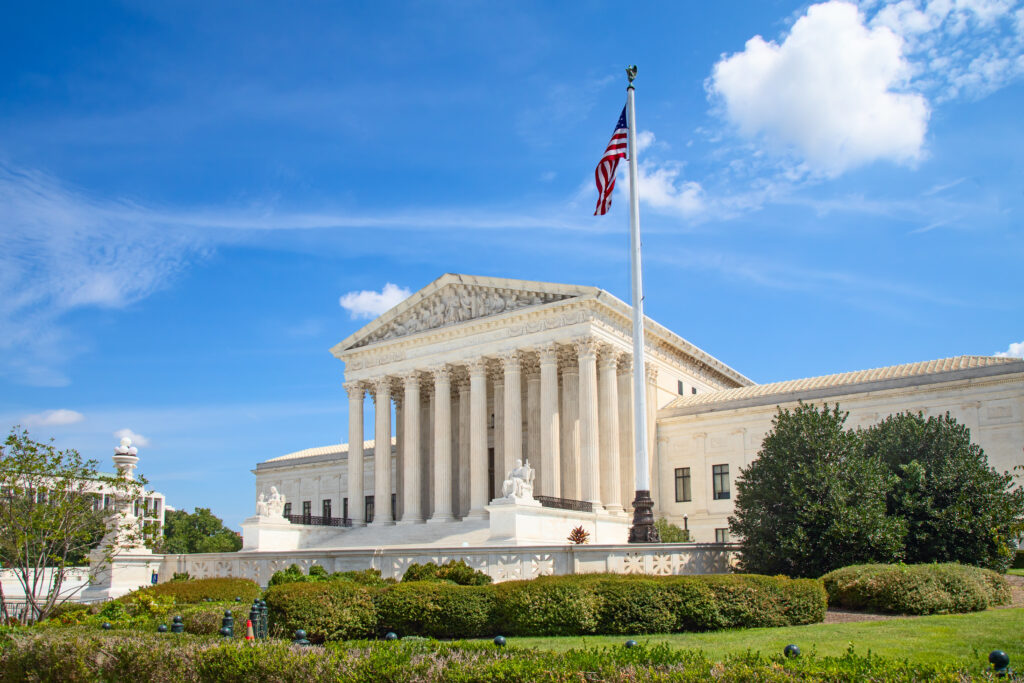U.S. Supreme Court Agrees To Reinstate Virginia’s Voter Purge Program

In a 6-3 order, the U.S. Supreme Court agreed to reinstate Gov. Glenn Youngkin’s (R) voter purge program that erroneously canceled the registrations of many naturalized citizens and other eligible individuals on the eve of the Nov. 5 general election.
Accordingly, the commonwealth is no longer bound by a lower court’s ruling that ordered election officials to restore to the voter rolls nearly 1,600 individuals whose registrations were canceled or marked as inactive.
Pennsylvania Republicans have also taken their case about mail-in voting to the U.S. Supreme Court, which could issue a decision at any time.
Sign up for our free newsletters so you never miss a new lawsuit or court decision that could impact who takes the White House this fall.
The Court’s order — from which the three Democratic-appointed justices dissented — did not provide an explanation for the stay. In light of the high court’s move, advocates are urging affected voters to take advantage of Virginia’s same-day registration option, which allows individuals to register in person at their polling place and cast a provisional ballot from now through Election Day.
Both a federal district court judge and the 4th U.S. Circuit Court of Appeals agreed Virginia’s controversial voter purge program likely violates the National Voter Registration Act’s (NVRA) “quiet period,” which prohibits states from systematically removing voters from the rolls within 90 days of a federal election.
The commonwealth subsequently asked the Supreme Court to halt the district court’s order and allow officials to revive the blocked purge program before Election Day.
In its stay request, Virginia said the 1,600 voters at issue “self-identified [as] noncitizens” and argued that the NVRA’s 90-day quiet period “does not apply to the removal of…noncitizens.” However, the district court determined the commonwealth’s claim about individuals self-identifying as noncitizens was unsubstantiated by the factual record in the case.
Earlier this month, the U.S. Department of Justice (DOJ) and advocacy groups filed lawsuits concerning Youngkin’s Aug. 7 executive order that required Virginia’s elections commissioner to regularly remove individuals “identified as non-citizens” who haven’t responded to a request to verify their citizenship within 14 days.
Additionally, the contested program mandated that individuals removed from the voter rolls due to alleged noncitizenship be referred to the Virginia attorney general’s office for criminal investigation and potential prosecution.
Both lawsuits underscored the program’s flawed methodology, which involved removing purported noncitizens based on outdated and sometimes inaccurate citizenship data from the Department of Motor Vehicles (DMV).
Many now-naturalized individuals who were ineligible to vote when obtaining their driver’s licenses have since lawfully registered upon becoming U.S. citizens, but their DMV records don’t reflect such a change in citizenship status.
The suits also described how the error-ridden purge process led to eligible U.S.-born voters being wrongly removed from the rolls. For instance, Christine Rabassa — a lifelong U.S. citizen and decades-long Virginia resident — learned her voter registration was canceled since she forgot to check the citizenship box on her DMV paperwork.
At the Supreme Court level, 26 Republican attorneys general and the Republican National Committee chimed into the case via amicus briefs supporting Virginia’s request to reinstate its purge program. On the other side, a group of former GOP members of Congress urged the Court to keep the purge program blocked, contending it runs afoul of the NVRA.
Just two weeks ago, a Trump-appointed judge preliminarily blocked the implementation of Alabama’s voter purge program at the request of the DOJ and nonprofit organizations. Alabama’s program similarly attempted to nullify the voter registrations of individuals flagged as noncitizens during the NVRA’s 90-day quiet period.